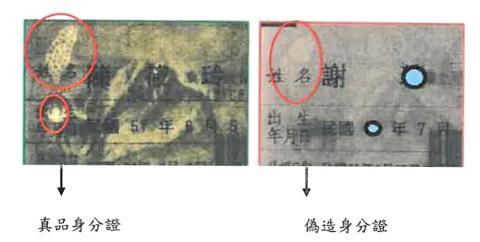Fake Republic of China (ROC) identification cards made in China pose the same level of threat to national security as African swine fever, Democratic Progressive Party Legislator Lai Jui-lung (賴瑞隆) said yesterday.
The national ID card has the best anti-counterfeit technology among all identification documents in the nation, a Ministry of the Interior official said yesterday on condition of anonymity, but added that the ministry has noticed recent cases of fake national IDs “that looked almost authentic.”
China’s ability to supply anti-counterfeit paper, color-changing ink and other materials — some of which can be purchased via the Internet — to produce ROC identification cards could have an impact on Taiwan’s security, the source said.

Photo courtesy of the Ministry of the Interior
People could use fake national ID cards to apply for passports, impersonate others or take out loans, or Chinese intelligence officers or spies could use them to engage in clandestine work, the source said.
For example, each year, the military opens its camps to the public for visits as a way to promote civil defense and display its advanced weapons, the source said.
Taiwanese can tour the grounds by showing their national ID cards, but Chinese tourists are prevented from entering, the source added.
If counterfeit technology is capable of producing fake IDs that look authentic, then Chinese with ulterior motives could enter military camps using fake IDs and survey Taiwan’s military facilities and equipment, the source said.
Lai said that if fake ROC IDs are produced in China or used by Chinese intelligence officers to enter Taiwan, this would be as “scary” as the outbreak of African swine fever in China.
The potential impact would be enormous, he said, urging the government to introduce national ID cards with integrated chips soon to curtail the threat.
As China steps up its “united front” tactics against Taiwan, the number of unidentified individuals who are lurking in Taiwan is increasing, he said.
The national security and police agencies should investigate how to prevent or ban the sale of “toxic pork” and materials used in the production of fake IDs via the Internet, he said.
The Executive Yuan last month announced that it would replace national ID cards with electronic ID cards in the second half of next year.
The new ID cards would be harder to counterfeit than the current cards, which are made of paper, the ministry said.

A Chinese aircraft carrier group entered Japan’s economic waters over the weekend, before exiting to conduct drills involving fighter jets, the Japanese Ministry of Defense said yesterday. The Liaoning aircraft carrier, two missile destroyers and one fast combat supply ship sailed about 300km southwest of Japan’s easternmost island of Minamitori on Saturday, a ministry statement said. It was the first time a Chinese aircraft carrier had entered that part of Japan’s exclusive economic zone (EEZ), a ministry spokesman said. “We think the Chinese military is trying to improve its operational capability and ability to conduct operations in distant areas,” the spokesman said. China’s growing

Taiwan yesterday denied Chinese allegations that its military was behind a cyberattack on a technology company in Guangzhou, after city authorities issued warrants for 20 suspects. The Guangzhou Municipal Public Security Bureau earlier yesterday issued warrants for 20 people it identified as members of the Information, Communications and Electronic Force Command (ICEFCOM). The bureau alleged they were behind a May 20 cyberattack targeting the backend system of a self-service facility at the company. “ICEFCOM, under Taiwan’s ruling Democratic Progressive Party, directed the illegal attack,” the warrant says. The bureau placed a bounty of 10,000 yuan (US$1,392) on each of the 20 people named in

Nine retired generals from Taiwan, Japan and the US have been invited to participate in a tabletop exercise hosted by the Taipei School of Economics and Political Science Foundation tomorrow and Wednesday that simulates a potential Chinese invasion of Taiwan in 2030, the foundation said yesterday. The five retired Taiwanese generals would include retired admiral Lee Hsi-min (李喜明), joined by retired US Navy admiral Michael Mullen and former chief of staff of the Japan Self-Defense Forces general Shigeru Iwasaki, it said. The simulation aims to offer strategic insights into regional security and peace in the Taiwan Strait, it added. Foundation chair Huang Huang-hsiung

PUBLIC WARNING: The two students had been tricked into going to Hong Kong for a ‘high-paying’ job, which sent them to a scam center in Cambodia Police warned the public not to trust job advertisements touting high pay abroad following the return of two college students over the weekend who had been trafficked and forced to work at a cyberscam center in Cambodia. The two victims, surnamed Lee (李), 18, and Lin (林), 19, were interviewed by police after landing in Taiwan on Saturday. Taichung’s Chingshui Police Precinct said in a statement yesterday that the two students are good friends, and Lin had suspended her studies after seeing the ad promising good pay to work in Hong Kong. Lee’s grandfather on Thursday reported to police that Lee had sent